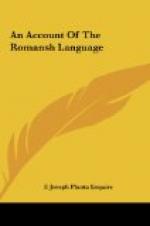Among this variety of conjectures and acute controversies, I find it however agreed on all hands, that the vocabulary of the Roman, and the idiom of the Celtic, have chiefly contributed to the formation of the Gallic, Romance, which is sufficient to prove that it partakes of a common origin with that of the Grisons.
There are incontestable proofs that this language was once universal all over France; and that this, and not immediately the Latin, has been the parent of the Provencal, and afterwards of the modern French, the Italian, and the Spanish. The oath taken by Lewis the Germanic, in the year 842, in confirmation of an alliance between him and Charles the Bald his brother, is a decisive proof of the general use of the Romance by the whole French nation at that time, and of their little knowledge of the Teutonic, which being the native tongue of Lewis, would certainly have been used by him, in this oath, had it been understood by the French to whom he addressed himself. But Nithardus,[AP] a contemporary writer and near relation to the contracting parties, informs us, that Lewis took the oath in the Romance language, in order that it might be understood by the French nobility who were the subjects of Charles; and that they, in their turn, entered into reciprocal engagements in their own language, which the same author again declares to have been the Romance, and not the Teutonic; although one would imagine that, had they at all understood this latter tongue, they could not but have used it upon this occasion, in return for the condescension of Lewis.




